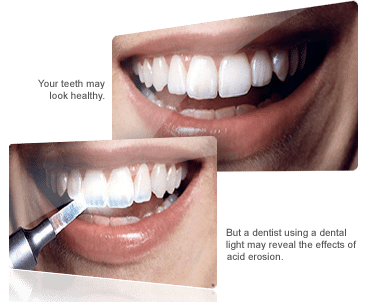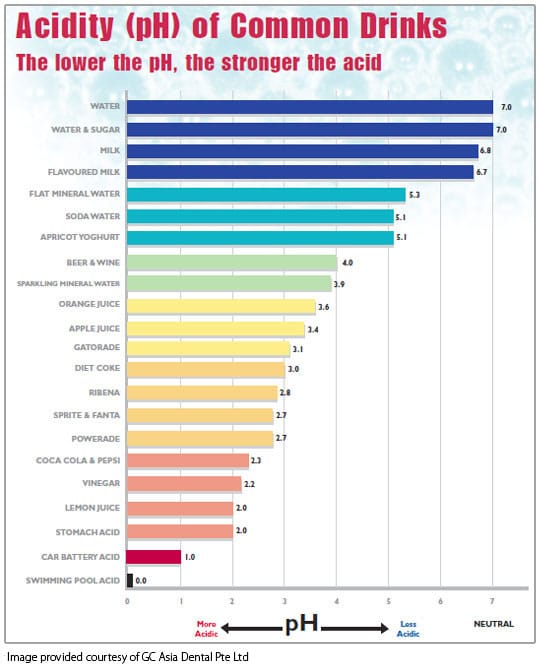What is acid erosion?
Many of the foods and drinks we consume contain acid, which can temporarily soften the hard enamel surface of your teeth. Over time the enamel is dissolved and eventually becomes thinner. Brushing after consuming acidic foods or drink will wear away the softened enamel faster. This wearing of enamel caused by acid in our diet is called acid erosion.
What causes acid erosion?
Food and Drink: Studies have shown that acidic drinks such as citrus-based and other juices, soft drinks, sports drinks, herbal teas and wine, fruit and chewable vitamin C tablets are likely to exacerbate dental erosion. It is important to note that caffeinated beverages and alcohol, especially wines, are also dehydrating as well as acidic and can lead to dry mouth this therefore increases the risk of acid erosion.

Reflux: Reflux is a common cause of tooth erosion, as your teeth are attacked by the acid in the reflux. Reflux may also be a side effect of pregnancy, your diet and is also caused by some medications.
Chronic vomiting: Chronic vomiting conditions can severely erode your teeth causing loss of dental enamel, yellowing of teeth, and may also increase chips and fractures of the enamel as it becomes thinner.
Dry Mouth: Saliva helps to neutralise the acid in your mouth, insufficient saliva will allow acid to damage your teeth more quickly.

What are some of the signs of acid erosion?
Teeth may develop a yellowish appearance as enamel becomes thinner and the yellower dentine shows through. You might notice a rounded look on the surface and edges of the teeth.
In the later stages, teeth may appear slightly transparent near the biting edges, and small cracks may be visible at the edges of the teeth.
Thinning enamel may also be a cause of sensitivity. As dentine becomes exposed through loss of enamel, an occasional slight twinge may be felt when consuming hot, cold, sweet or acidic (e.g. wine or juice) foods and drinks. Sensitivity usually means that the erosion is active and therefore needs to be treated.
Keys to preventing acid erosion:
Enjoying food and drinks is part of living a balanced life, and it isn’t necessary to cut out these drinks or foods all together. Instead there are some key things that people can do to ensure they are maintaining good oral health while enjoying their choice of food and beverages.
- Avoid holding or ‘swishing’ soft drinks or sport drinks around the mouth as this increases the likelihood of dental decay and enamel erosion.
- Use a straw where possible as this minimises exposure of the beverage to teeth.
- Never brush your teeth immediately after consuming acidic food or drink. Wash your mouth with water, and wait approximately 1 hour before brushing.
- Drink fluoridated tap water as much as possible. Try to follow the consumption of acidulated drinks with a glass of water as it helps wash the sugars and acids from these beverages away.
- Make sure that you maintain a routine of brushing with fluoride toothpaste at least twice a day after meals, clean in between your teeth and visiting Adams Dental practice regularly.





